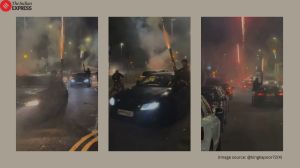Click here to follow Screen Digital on YouTube and stay updated with the latest from the world of cinema.
Mix and Match
Composer: Amaal Mallik, Akhil Sachdeva and Tanishk Bagchi and Lyrics: Shabbir Ahmed, Kumaar, Akhil Sachdeva, Indeevara, Badshah
 A still from the movie
A still from the movie
Chalat musafir moh liyo re, pinjre wali muniya, a folk melody bristling with life in Raj Kapoor’s Teesri Kasam is remembered as one of Shankar-Jaiskishan’s finest hour. Shashank Khaitan’s Varun Dhawan and Alia Bhatt-starrer Badrinath Ki Dulhania takes this ditty in its entirety and turns it into the title track Badri ki dulhania, of course with slight alterations. The credit, however, for “composing” the song has gone to Tanishk Bagchi, probably for the slight tweaks he gave to the original. Bagchi is also “inspired” by OP Nayyar’s Kajra mohabbatwala, which shows up in the harmonium interlude. We all love a catchy hook, the song delivers it, albeit unabashedly copying it.
Badrinath Ki Dulhania is a classic case of too many boatmen sinking the boat. The music of the film rests on the typical format of having that five-song combination with a love ballad, a melancholic ditty, a dance number with some squelches in place and a retro piece.
The album opens with Aashiq surrender hua that reminds one of Chalao na naino se baan re from Bol Bachchan. Some squelches and dhol sounds open the song sung by Amaal Malik. Lyrics such as Tune English mein jab humko daanta toh aashiq surrender hua don’t do much service to anyone. Shreya Ghosal has been completely wasted as a singer in this extremely ordinary piece. Akhil Sachdeva just batters the vocals in Humsafar, which isn’t a bad composition. The song, overall, is so wobbly that one wonders if the person handling the autotuner knew how to handle the machine. The female voice is uncredited but sounds much better than Sachdeva, who has tried to sound like Atif Aslam, and fails miserably.
The trend of remixing a retro piece seems to have returned. Almost every other film is picking one song, getting some local poets who call themselves rappers to add their bit and expecting success. Ameen Sayani’s trademark line “Namaste behno aur bhaiyon” opens Anuradha Paudwal and Bappi Lahiri’s Tamma Tamma. Most of the original song has been retained. Baadshah raps midway through the track. It’s not bad, and is a desperate attempt at finding airtime and popularity.
The only song that makes us sit up a little is Arijit Singh’s Roke na ruke. Now, it isn’t a great piece of music, but amid the din that this album is, the sarangi prelude suddenly catches one’s attention. Singh sings this one well, like he does in most of his pieces. The ditty is a guitar-and-drums track that has the singer carry a regular composition very well, all expressions in place that come through.
The album needed something like a Main tenu samjhawan (Humpty Sharma Ki Dulhania) to find some kind of resurrection in the current music scene. For now it remains a little below the middle rung tunes and is likely to vanish without much blip on the charts.




- 01
- 02
- 03
- 04
- 05






























